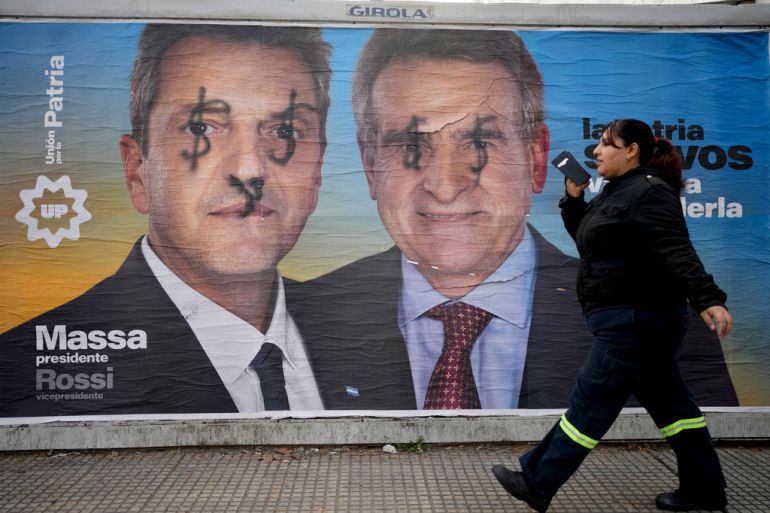Voters express frustration ahead of Argentina primary election
Triple-digit inflation and the killing of an 11-year-old girl have stoked frustration with the political establishment.

Experts are predicting low voter turnout in advance of primary elections in Argentina this weekend, as the country struggles under the weight of triple-digit inflation.
The primary vote, set to take place on Sunday, will finalise the candidates set to face off in the October general election and serve as a bellwether for the sentiments of voters, many of whom remain undecided.
Keep reading
list of 3 itemsCould BRICS rescue Argentina’s economy?
Argentina’s President Fernandez will not seek re-election
“I still don’t know who I’m going to vote for, and I think we’re all in the same position. No one votes for ideas or political affinity any more. It’s all a punishment vote,” Cristian Guardo, a supervisor at a food company, told the news outlet Reuters.
Voting is compulsory in Argentina for all citizens between the ages of 18 and 70, but public opinion polls suggest apathy is high going into the primaries. While voters remain tepid about the candidates, the economy and crime have emerged as key campaign issues.
Jockeying for the presidency
In April, centre-left President Alberto Fernandez announced he would not seek reelection, after a four-year term that spanned the COVID-19 pandemic, skyrocketing inflation and numerous scandals, including a spat with the Supreme Court.
That decision has put the presidency up for grabs, and Sunday’s primaries will narrow the slate of hopefuls. Economy Minister Sergio Massa, a centrist, is leading the race to replace Fernandez as the candidate for the governing Peronist coalition, now called “Union por la Patria” or “Union for the Homeland”.
But if Massa wins the nomination, he will face stiff competition from the conservative opposition bloc, called “Juntos por el Cambio” or “Together for Change”.
Two main contenders are seeking to emerge as the conservative candidate on Sunday: former Security Minister Patricia Bullrich and the more moderate Horacio Rodríguez Larreta, who serves as mayor of the capital city Buenos Aires.
Then there is the libertarian dark horse, economist Javier Milei, who is seen as riding a crest of discontent with the two main political coalitions.
A pollster for the research firm Opina Argentina told the Reuters news agency that the conservative bloc and the Peronist coalition were drawing similar levels of support, between 28 and 35 percent, with the conservatives hanging on to a slight edge.
But Milei could pull off an upset, with opinion polls placing his support at 20 percent.
Killing pauses final campaign stops
While inflation and rising poverty have taken centre stage in the election, the killing of an 11-year-old girl this week has put concerns about crime in the spotlight as well.
Morena Domínguez died on Wednesday after she was assaulted and robbed on her way to school in Lanús, a city just south of Buenos Aires. Video showed two men on a motorbike snatching her backpack. Domínguez fell to the ground and later passed away at a hospital, with media reports indicating she had suffered a fatal blow to her liver.
Argentina has one of the lowest homicide rates in South America, but the killing has shocked the country, leading high-profile candidates — including Massa, Rodríguez Larreta and Bullrich — to call off their final campaign rallies.
Bullrich, who has pushed for tough-on-crime measures, took to social media to call for action following Domínguez’s death. “We can’t keep living with so much anguish and fear,” she wrote.
But the 11-year-old’s killing has also stoked anti-government sentiment in the lead-up to the primaries. In the wake of the incident, a group of demonstrators pelted police in Lanús with stones and chanted, “Don’t vote! Don’t vote!”
“We are tired of promises,” resident Rosa Ybarrolla told the news outlet AFP. “Because when their speeches are made, they are beautiful. They promise you security. They promise you work. They promise you everything, but then nothing happens.”
Domínguez’s mother Maria also told the news outlet, “Does a child have to die for there to be security?”